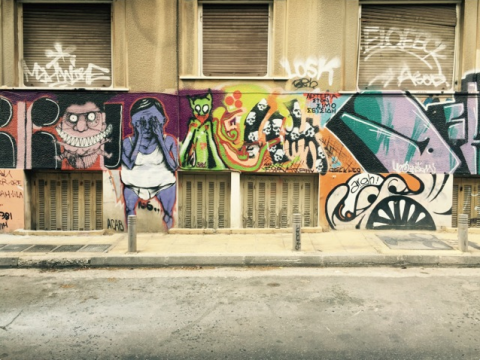
Report #5 from Athens
Today I had dinner with an American friend in Exarcheia. Nothing remotely similar to Exarcheia exists in the United States. It is widely known as the "anarchist district" of Athens. According to my dinner companion, anarchist Exarcheia originated in 1973 in the student uprising that led to the overthrow of the fascist military junta that had ruled Greece since the end of World War II, when it came to power with the assistance of the British army. Exarcheia contains the Polytechnic University where the rebellion first broke out. The surrounding area was soon colonized by anarchists and other rebels, and modern Exarcheia was born. The neighborhood looks a little like Greenwich Village before it was gentrified, except that nearly every inch of available wall space is filled with graffiti, some of it of the highest artistic caliber. There are also anarchist signs everywhere as well posters announcing plays, films, anti-fascist demonstrations, and more. The OXI sign, urging a "No" vote in the now irrelevant referendum on the penultimate deal offered Greece by the Troika is prominent in many locations.
In general accord with the Greek custom, many of the anarchists in Exarcheia run or work in small businesses - bars, cafes, restaurants, theaters, record stores, and so on. The euro is the currency for transactions, although there was a failed attempt to move to the use of Bitcoin. There are, however, no banks. Were one to try to come in, it would be burned to the ground. The cops don't enter Exarcheia either, because Molotov cocktails get thrown at them. Even though there are no police in the neighborhood, there is not much crime. It is perfectly safe to walk alone after dark. However, police are stationed along the perimeter of Exarcheia. Their function is to keep the anarchists from leaving in times of political turmoil.
Tomorrow may be such a time. It's the day Tsipris tries to get Parliament to pass the legislation necessary to implement the deal the Troika imposed on him. The communist-aligned public employee union has called for a one-day general strike ending with a demo in front of the Parliament building in Syntagma Square. The union has a direct stake in blocking the legislation because it includes a law that would make firing public employees easier. Many people on the Left, and some on the Right, are angry over what they regard (rightly, in my view) as Tsipris' capitulation to the new masters of Greece: Germany, the Central European Bank, and the IMF. Their ultimatum is that funds will not be released to keep Greek banks afloat and enable the government to make its next payment on the debt unless VAT (Value Added Tax) is raised, a special top up supplement for pensions for the poor is abolished, unions are weakened, the retirement age is raised to 67, and Greece sells 50 billion euros of public property. It is not at all clear that Tsipris will be able to get Parliament to sign off on the legislation. The Left Platform within his own party, Syriza, is threatening to vote “No,” as is his junior partner in government, a party of middle-class nationalists. The dilemma both groups face is that failure to pass the legislation will most likely bring down the government and result in early elections. Syriza has been in power for only five months.
A “No” vote will also result in a bank collapse and probably a swift exit from the euro. The problem is not that Greece will return to the drachma. That is part of a solution to the country's difficulties, because it would allow a currency devaluation that would attract foreign money to Greece, and make Greek exports less expensive. The problem is that Grexit would occur amidst political chaos and at the initiative of the Troika, instead of being phased in by a government plan.
Until now, the Left Platform (which wants to leave the euro), has been a minority faction within the government (about 25 percent of Syriza MPs). We will see tomorrow if, by some miracle, it is able both to hold its ground and to win over a significant number of other MPs. That might result in a real government of the Left, but under extraordinarily difficult circumstances. In any event, I’m not holding my breath.
Longtime Open Media Boston contributor Gary Zabel is a professor of philosophy at UMass Boston - and most recently, the director of the division of political economy of the new online international graduate college The Global Center for Advanced Studies. He is visiting Greece for the college's founding conference, Democracy Rising, and will be sending a series of reports about his trip in his role as Our Man in Athens.

